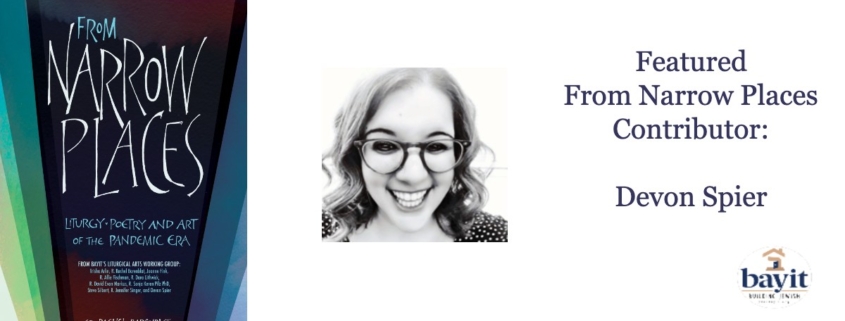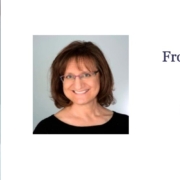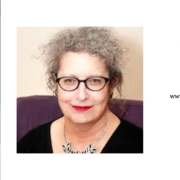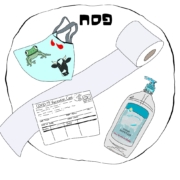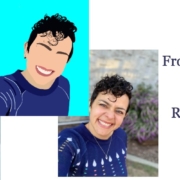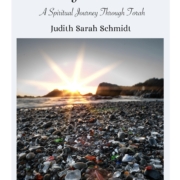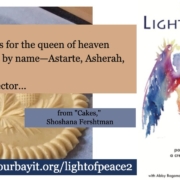Devon Spier in From Narrow Places
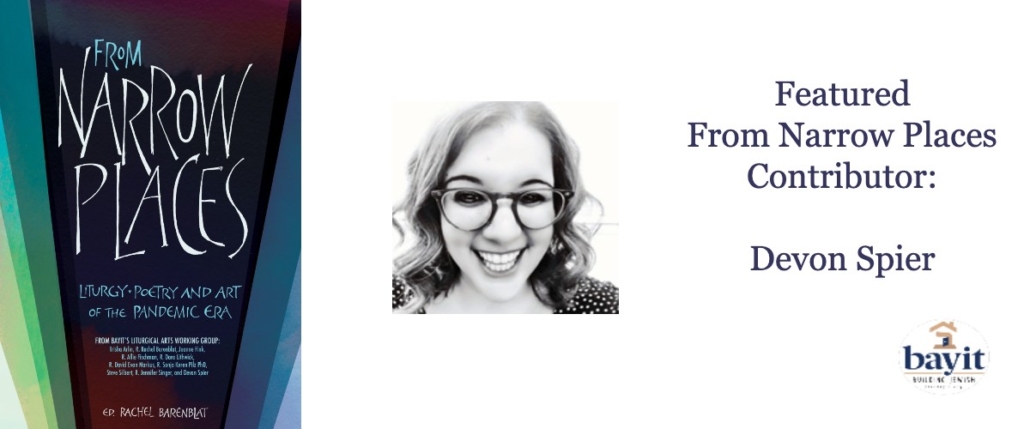
Devon Spier’s website
Buy the book: yourbayit.org/narrow-places/
Devon Spier, a member of Bayit’s Liturgical Arts Working Group, is an author and visual poet theologian (proemologian), who weaves and teaches others to weave poems, prose and theology through digital images. Believing that Jewish life can be an elevated expression of democracy, she transmits a Judaism of heart in which people and their lives are embraced exactly as they are. Devon is the most published author on Ritualwell.org and has resourced nearly every mainstream movement, network and denomination of Judaism to explore the intersections of health, recovery, trauma and well-being. Her work has been consulted and published by the London School for Jewish Studies, the Reconstructing Judaism movement, The Union for Reform Judaism, Liberal Judaism (UK), Jewish Women’s Archive, Hevria and Jewcer: The Leading Crowdfunding Platform for Jewish Causes, the City Museum of New York, Ben Yehuda Press, Repair The World, AVODAH: The Jewish Service Corps and most recently, the National Council of Jewish Women, which used her work to resource members on solidarity with indigenous sovereignty and rituals for reproductive freedom. The author of two bestselling books, Heart Map and the Song of Our Ancestors and Whatever it is, gently: Meditations for the Quiet Noise of the Pandemic, Devon‘s poetry conveys the possibility of a deeper listening to anyone who stands at the Jewish margins, whom she regards as the actual centre of Jewish life and spiritual practice. She is proudest of the fact that her work is being used by an emerging generation of Jewish leaders and communities who both question and belong, asking of each other and G-d: “What is it that we aren’t talking about?”
Here’s a glimpse of her work from the book:
‘Jeremiahs without a jeremiad’
or lamentations
for those with pages
of unwritten loss
lamenting
Jerusalem
and everything else
they never had
but Are
somehow
we are — some(how?)
on
Tisha b’Av—
what of the prophets
who don’t say a word
whose bodies are
abandoned highways
and vacant city lots of unspoken griefs and ill completed thoughts
devoured!
the Greatest Mourning‘s
set calendar day
what is the way to you
Jerusalem
when you are travelling
in your own fearful
circles to get through a day
and in Sickness’ time
inside resting restless time
who is a day
“And she can only sigh.
And shrink back” (Eicha 1:8)
confined
in this house of lies
and i don’t mean lockdown
quarantine
there were villains in masks
and politicians pocket books
full filled up fast
before time slowed
and we learned we
collectively couldn’t
and hadn’t moved
in some time
some owner’s privatized time
the world has stopped
the bill has come due
“Zion spreads out her hands” (Eicha 1:17)
we are unclean
removed
and i scream in parking lots
past curfew
on Av
if the sword is out
and the plague is in
we have to get real sick
for a new world
to break through the deep of our skins
Old world has gone out swinging
And yet
Jerusalem is me is you
out of the mouths of captives
who never sung
the flower
the fury
of fiery songs
surge
the only way back
is furthest from
and through
Devon Spier
Purim Poem #2
I sat at the back of your throat
And you took my hand
It was dark
and after midnight
and stumbling up
from the table
I could not tell
your name from the one you gave me
My breath smells of wine
My pockets are filled with
Bad long sentences and
Some ancestor I don’t know’s old crumbs
Lock down is a lock Up
And I have a confession
I am begging You
to
Beat me down into submission
So I don’t have to say the words everyone feels and doesn’t say
My name is
Rabbah
I mean Rava
And
I am not alcoholic
I am a polemic
I hope my name rises with me in the morning
Devon Spier
bodies of water
This poem could be used as a prelude to the bracha over karpas or as an intention between the 7th to 8th day of Passover to mark the crossing of the red sea, as a way of signifying the re-entry into spring and liberation but also, the complicated circular return at the heart of any Exodus, let alone in the midst of our current pandemic.
Recalling Miriam’s dancing at the sea and Joseph’s history in Egypt, this intention allows for the recollection of settling in the land during drought, the economic upturn during his years of plenty and the eventual degradation of the Isralites through the yoke of slavery. Through the remembrance of water, we are called to the principles and practices that honour life and re-extend the Source of Life that nurtured our ancestors to all of creation.
i measure
my life
in
bodies
of
water
the Nile
new babe’s tears
a well
the Sea
oh
i have crawled
and called
and danced
and dreamed
i have been
and i am aging
ageless
aged
and free
but the griefs
are as waves
to me
and i wonder
some days
if i am not merely
the passing
thought
at the bottom
of someone else’s
watery
stream
g-d will i live
g-d will i tell
g-d will i write
g-d will i die well
listen
the flood is speaking
now
i am still young
the cup
this life is not a shell!
Devon A. Spier
Devon Spier’s website
Buy the book: yourbayit.org/narrow-places/
From Narrow Places: Liturgy, Poetry, and Art of the Pandemic Era was published this month by Bayit and features the collaborative work of our pluralist Liturgical Arts Working Group over the first eighteen months of the COVID-19 pandemic.

